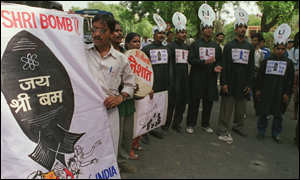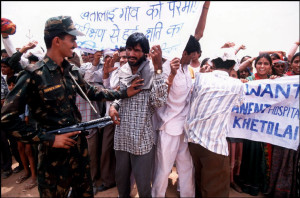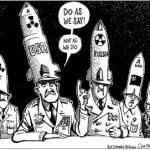Apart from introducing the dreadful nuclear weapons to South Asia, the Indian nuclear tests in 1998 also marked a decisive militarist turn under the ultra-nationalist BJP for the Indian state and polity which have become increasingly undemocratic, exclusivist and violent. Here is an article that Anil Chaudhary, one of the founding members of the CNDP wrote in September 1998 in a Hindi magazine called Namabar.
Those who know driving, they know that before changing the gears one needs to press the clutch. Pressing the clutch lowers the grip on the gear-box and the driving starts feeling lighter. At the same time, the gear is changed and clutch is gradually left to its original position, which again starts functioning for speed-control. Running a country is also somewhat like driving a vehicle. Every time you need to change its speed, direction or rhythm, you need to press clutch one or other kind.
 If a country has led the non-aligned nations for half a century, broadly stood with the Soviet camp in world politics and its new rulers want to drive it to the American lane even without a majority in the parliament, it requires nothing less than a decisive change of gear. Those running the govt this time in India assume that they hold a copy-right over nationalism, so they pressed the clutch of “national pride” in form of the nuclear tests in order to change the gear. The clutch was pressed in Pokharan on May 11 and 13th, ‘Buddha smiled’, and whole world was stunned. The clutch was pressed so deftly that no body could hear it or see it coming. If anybody knew in the whole world, it was the newspaper of a “cultural(non-political) organisation” based in Nagpur. America almost turned a blind eye. Its numerous satellites wandering in the spatial nothingness to keep a watch over the entire earth apparently could not know anything about the tests. Such indifference of the global watchman towards India doesn’t go down so easily.
If a country has led the non-aligned nations for half a century, broadly stood with the Soviet camp in world politics and its new rulers want to drive it to the American lane even without a majority in the parliament, it requires nothing less than a decisive change of gear. Those running the govt this time in India assume that they hold a copy-right over nationalism, so they pressed the clutch of “national pride” in form of the nuclear tests in order to change the gear. The clutch was pressed in Pokharan on May 11 and 13th, ‘Buddha smiled’, and whole world was stunned. The clutch was pressed so deftly that no body could hear it or see it coming. If anybody knew in the whole world, it was the newspaper of a “cultural(non-political) organisation” based in Nagpur. America almost turned a blind eye. Its numerous satellites wandering in the spatial nothingness to keep a watch over the entire earth apparently could not know anything about the tests. Such indifference of the global watchman towards India doesn’t go down so easily.
This was followed by the round of orchestrated condemnations and clarifications. The self-proclaimed order-keeper of the world, the United States, asked both India and Pakistan to address bilateral issues and sign on to the CTBT on this occasion. Threats were issued to discontinue the aids, and then the private investments were soon marked out of the purview. On human grounds, settling all the debts and grants were left to the politicians, so that they could use it for political muscle-flexing. The claims of nuclear bestowing international power on India proved to be an irony so soon.
Inside India, all the present, former and could-be MPs, ministers and Prime Ministers sang paeans in praise of the scientists, deployed every means to share some of the credit and a few expressed their unhappiness albeit in whispers. The celebrated non-political and cultural organisations gave calls to celebrate national pride day in ways that unleashed fear among the minorities. The citizens of India were informed that the country faced imminent danger from China, with which India had the last war not less than 35 years back, and from the neighbouring Pakistan with whom the country fought and won a war 27 years ago. To ward off these two threats, having nuclear weapons and equipping the military with those weapons was an undisputed requisite. Once we have the atomic bombs, then these enemies with whom we didn’t have a war for more than a quarter century, would be deterred forever and would never think of attacking us.
Some people actually believed all this and they felt proud of the nuclear blasts, while some felt guilt that there are still many other reliefs. In a country that cannot send all its kids to school after five decades of independence, the youth do not have jobs and toiling hard doesn’t fetch reasonable money, if a few people don’t feel proud of this great ritual, their childishness can be forgiven. But the scarcity of water and electricity, and the galloping prices of onions an potatoes soon robbed us of this sense of collective pride.
 Joys of a shaky ruling coalition with a gobbled-up cabinet in a parliamentary democracy would anyway be shot-lived. The pressure of demands from the IMF and World Bank on one hand, those of the international sanctions and agreements on the other and the implosive tension within from the coalition-partners did not leave much for the government to do for itself or for the people. The clutch of the national pride provided it with a very little leverage. The far and wide spread branches of the giant cultural organisation did their best to disseminate the message – of what a great service the govt has done for the country by blasting the bombs. Those who are not feeling proud of it, must have something missing in them. Such people have no right to live in this country. It’s sucha relief that citizenship is a political issue, not a cultural one. Else, a lot of people would have lost their citizenship. The blasts did not only help the otherwise worthless government, but also acted as a clutch of national pride to change the gear of Swadeshi (self-reliance). Within a few weeks of the nuclear tests, virtually unlimited reserves of coal and oil were opened up for the foreign companies. On that count, it was a masterstroke of changing so many gears just with a single clutch.
Joys of a shaky ruling coalition with a gobbled-up cabinet in a parliamentary democracy would anyway be shot-lived. The pressure of demands from the IMF and World Bank on one hand, those of the international sanctions and agreements on the other and the implosive tension within from the coalition-partners did not leave much for the government to do for itself or for the people. The clutch of the national pride provided it with a very little leverage. The far and wide spread branches of the giant cultural organisation did their best to disseminate the message – of what a great service the govt has done for the country by blasting the bombs. Those who are not feeling proud of it, must have something missing in them. Such people have no right to live in this country. It’s sucha relief that citizenship is a political issue, not a cultural one. Else, a lot of people would have lost their citizenship. The blasts did not only help the otherwise worthless government, but also acted as a clutch of national pride to change the gear of Swadeshi (self-reliance). Within a few weeks of the nuclear tests, virtually unlimited reserves of coal and oil were opened up for the foreign companies. On that count, it was a masterstroke of changing so many gears just with a single clutch.
India finally got the great leadership and good governance that it was waiting for all these decades. Today this leadership is so happy after the release of the next instalment of the World Bank loan, proud to have the MPs and business leaders of the US on its side, and the acceptance by the US as a legitimate nuclear power has become our supreme national goal. India was not seen so eagre to please the US for its national pride ever before. These are mere symptoms of the gear-change, waiting to mature before the India visit of President Clinton, when a fearless India would gift its accession to the CTBT and the NPT to its new master.
The clutch of national pride was deployed to shift India into such an ultra-nationalist gear that it almost feels like shifting from a left-hand driving to a right-hand one.

